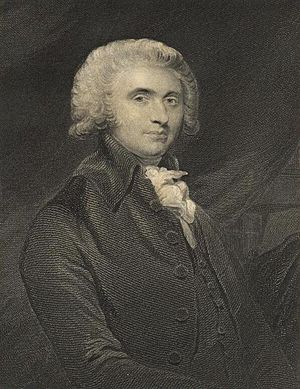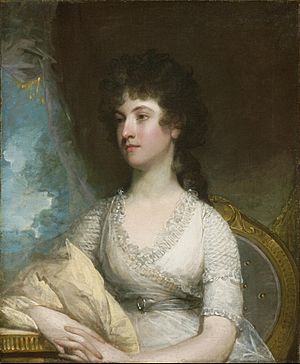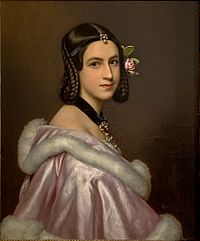David Erskine, 2nd Baron Erskine facts for kids
Quick facts for kids
The Lord Erskine
|
|
|---|---|

Portrait of Erskine c. 1820
|
|
| British Minister to Bavaria | |
| In office 1828–1843 |
|
| Preceded by | Brook Taylor |
| Succeeded by | John Milbanke |
| British Minister to Württemberg | |
| In office 1824–1828 |
|
| Preceded by | Henry Watkin Williams-Wynn |
| Succeeded by | Edward Cromwell Disbrowe |
| British Minister to the United States | |
| In office 1807–1809 |
|
| Preceded by | Anthony Merry |
| Succeeded by | Francis James Jackson |
| Member of Parliament for Portsmouth | |
| In office 1806–1806 Serving with John Markham
|
|
| Preceded by | Thomas Erskine John Markham |
| Succeeded by | John Markham Sir Thomas Miller, Bt |
| Personal details | |
| Born |
David Montagu Erskine
12 August 1776 |
| Died | 19 March 1855 (aged 78) Butler's Green, Sussex |
| Spouses |
Frances Cadwalader
(m. 1799; Anne Travis
(m. 1843; Anna Graham Durham
(m. 1852; died 1855) |
| Relations | Henry Erskine, 10th Earl of Buchan (grandfather) Daniel Moore (grandfather) |
| Children | 12 |
| Parents | Thomas Erskine, 1st Baron Erskine Frances Moore |
| Education | Winchester College |
| Alma mater | Trinity College, Cambridge |
David Montagu Erskine, 2nd Baron Erskine (born August 12, 1776 – died March 19, 1855) was an important British diplomat and politician. A diplomat is someone who represents their country in other nations.
He was a Member of Parliament (MP) for Portsmouth in 1806. An MP is like a representative in the government. After this, he became the British Minister to the United States. He was called back home in 1809 because of how he handled a disagreement called the Chesapeake-Leopard Affair. He didn't have a job in government again until 1824. That year, he inherited his father's special title. Later, he served as a Minister in Stuttgart and Munich before he retired in 1843. David Montagu Erskine was married three times and had twelve children with his first wife, Frances Cadwalader. He passed away in 1855, and his oldest son, Thomas, took over his title.
Contents
Who Was David Montagu Erskine?
David Montagu Erskine was born on August 12, 1776. He was part of a Scottish family known as Clan Erskine. His father was Thomas Erskine, 1st Baron Erskine, who was a very important lawyer and politician. His mother was Frances Moore.
David went to school at Winchester College and then studied at Trinity College, Cambridge. These were both famous schools in England.
His Career as a Diplomat and Politician
David Montagu Erskine did not become a lawyer, even though he studied law. Instead, he chose a path in politics and diplomacy.
Starting in Politics
In 1806, he was elected as a Member of Parliament for Portsmouth. He took over this role from his father, who had been given an even higher job as Lord Chancellor. The Lord Chancellor is a senior government minister.
Later that same year, his father asked Charles James Fox, who was the Foreign Secretary (like the head of foreign affairs), to appoint David as the British Minister to the United States. This was a very important job, representing Britain in America.
A Difficult Time in America
In 1809, David Montagu Erskine was called back to Britain by the Foreign Secretary, George Canning. This happened because of how Erskine tried to solve a big problem between Britain and the United States.
The problem involved something called the Chesapeake-Leopard Affair. This was when a British warship attacked an American ship. There were also rules called the Orders in Council, which affected American trade. Erskine tried to make a deal to fix these issues.
However, the British government, especially George Canning, was not happy with the deal Erskine made. They felt he had offered too much to the Americans. One historian, Paul Langford, explained that Canning made a big mistake by recalling Erskine. This made things worse between Britain and America. It even contributed to a war later on, called the War of 1812.
After being recalled, Erskine was not given another important job for a long time. He was out of favor until 1824.
Later Diplomatic Roles
In 1824, David Montagu Erskine inherited his father's title, becoming the 2nd Baron Erskine. This was a significant moment for him. After this, he was appointed as the British Minister to Stuttgart. Stuttgart was the capital of a German state called Württemberg.
In 1828, he moved to Munich, which was the capital of another German state called Bavaria. He continued his diplomatic work there. He finally retired from his diplomatic career in 1843.
His Family Life

Before becoming a Minister in Washington, Lord Erskine had lived in the United States. In 1799, he married his first wife, Frances Cadwalader. She was the daughter of John Cadwalader, a general during the American Revolutionary War. Frances was also a distant cousin of Lord Erskine. A famous artist named Gilbert Stuart painted a beautiful portrait of Lady Erskine.
David and Frances had twelve children:
- Thomas Americus Erskine (1802–1877), who later became the 3rd Baron Erskine and was also a diplomat.
- John Cadwalader Erskine (1804–1882), who became the 4th Baron Erskine and was also a diplomat.
- Steuarta Erskine (1810–1863).
- Elizabeth Erskine (c. 1812–1886).
- David Montagu Erskine (1816–1903), who was a Lieutenant-Colonel in the army.
- Edward Morris Erskine (1817–1883), another diplomat in the family.
- James Stuart Erskine (1821–1904), who was given a special title in Bavaria.
- Frances Erskine (died 1876).
- Sevilla Erskine (died 1835).
- Harriett Erskine (died 1855).
- Jane Plumer Erskine (died 1846).
- Mary Erskine (died 1874).

Thomas Americus was named after Frances Cadwalader's brother, who was an officer during the War of 1812. John Cadwalader was named after her father. Lady Erskine passed away in Genoa in March 1843.
After Frances died, Lord Erskine married Anne Travis in July 1843. Anne passed away in April 1851. Then, in 1852, he married his third wife, Anna Graham Durham. He did not have any more children from his second or third marriages.
Lord Erskine died at his home in Butler's Green, Sussex, in March 1855. He was 78 years old. He was buried in a place called Cuckfield. His oldest son, Thomas, became the next Baron Erskine. His third wife, Anna, later married another person in 1856 and passed away in 1886.
 | Kyle Baker |
 | Joseph Yoakum |
 | Laura Wheeler Waring |
 | Henry Ossawa Tanner |

